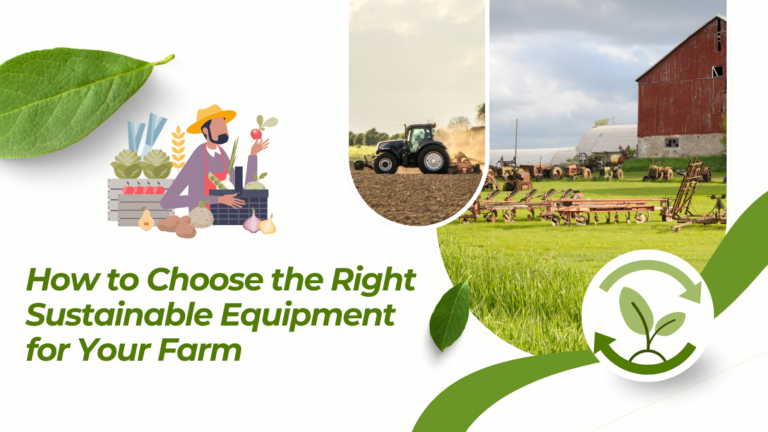Are you ready to transform your farm into a sustainable powerhouse? Choosing the right sustainable equipment is a step towards improving your yields and protecting our planet for future generations. With countless options on the market, the decision can feel overwhelming. But fear not—this blog is here to help you navigate the noise and find the equipment that aligns with your farming practices and environmental goals.
Whether you’re looking to enhance efficiency, reduce your carbon footprint, or embrace innovative technologies, understanding what to look for in sustainable equipment is essential. Let’s dive into how you can make informed choices that benefit your farm and the environment.
Assessing Your Farm’s Unique Needs
- Understand the specific needs of your crops and farming operations.
- Equipment can support productivity and sustainability.
- Precision farming can gain up to 20% more yield because such farms make optimal use of all the available resources.
- Existing machinery can sometimes be inefficient.
- Maintenance of up-to-date gear might save more fuel than the energy-efficient older model.
- Knowing what equipment already exists helps you decide what should be upgraded.
- Agriculture accounts for about 21% of the global greenhouse gas emissions.
- Selecting equipment compatible with sustainability criteria is essential for your farm to reduce carbon footprints.
The Importance of Sustainable Equipment in Agriculture
Sustainable equipment plays an important role in modern agriculture across all regions. With reliable farming machinery, a farmer can improve efficiency and compete globally through eco-friendly practices. High-quality equipment guarantees productivity, reduced operating costs, and reduced environmental impacts.
In Texas, different agro-culture settings produce great demand for environment-friendly farming equipment. Reliable farm equipment dealers are essential for Texas farmers who aim to improve their operations sustainably. Farmers can get the right equipment through john deere dealers texas, that are designed to bring out the best in agricultural practices by boosting efficiency and productivity.
Choosing sustainable equipment from trusted dealers has many benefits:
- These machines protect the environment by reducing emissions and fuel consumption.
- They can last longer without being replaced.
- Energy-efficient tractors and tools can reduce the running cost.
- This allows you to use your resources on other important areas of your farm.
- By choosing sustainable equipment, you increase the productivity level of your farm and contribute to creating a healthier planet.
Understanding Types of Sustainable Equipment
Energy-Efficient Machinery
When exploring sustainable farming equipment, focus on energy-efficient machinery that helps reduce fuel consumption and greenhouse gas emissions.
- Solar-powered irrigation systems and electric tractors are excellent investments. They decrease your reliance on fossil fuels and can save you money over time.
- Using modern, energy-efficient tractors will save fuel costs, making you more profitable. Most of the new models have advanced technology that optimizes fuel usage, hence more efficient.
Precision Agriculture Tools
Precision farming is transforming the way farmers manage their crops and resources.
- GPS technology can map the field accurately, and drones can monitor crop health and soil conditions. This technology enables farmers to make data-driven decisions, which leads to more efficient resource management.
- With precision tools, farmers can apply water, fertilizers, and pesticides more accurately. This approach reduces waste while minimizing impacts toward furthering their yields and advancing their use.
Renewable Resource Equipment
Investigating renewable resource equipment will help you work towards setting your farming on track with sustainability goals.
- Biofuel-powered equipment can reduce your carbon footprint. Buying farm equipment designed for alternative fuel is a great way to position your farm as a leader in sustainability.
- Soil health is enhanced by composting and organic waste management systems and reduces dependence on chemical fertilizers, creating a healthier farming ecosystem.
Evaluating Equipment Providers
Choosing the right equipment provider is as important as choosing the right equipment itself. Choose a manufacturer that focuses more on sustainability. Look for brands known for sustaining such practices. Customer reviews provide insights into the reliability and performance of equipment.
Warranty and Support Services:
A good warranty can save you money and trouble later on.
- Ensure that your equipment is covered by a good warranty in case of any issues. Good after-sales support is important in case of any problems you may encounter.
- Many good equipment manufacturers can provide training on how you can get the best possible use from new equipment.
Financial Considerations
Setting your budget for new equipment is very important in the decision-making process. While more expensive to purchase, sustainable equipment can save money on fuel and maintenance, meaning energy models will pay for themselves over time. Consider applying for grants and financing options for sustainable farming, as many organizations provide support to offset these costs.
Assess the return on investment (ROI) of sustainable equipment. Sustainable equipment impacts your productivity positively and indirectly affects your profits. Secondly, sustainable equipment offers environmental benefits and saves you on regulatory compliance costs, making it a good investment for your farm.
Practical Tips for Implementation
- Test the equipment before a purchase. This allows having hands-on experience and checking if it meets their requirements.
- Local agricultural fairs and dealer demonstrations also offer the opportunity to see this equipment in operation.
- Plan how the new equipment will fit the existing workflow so the application will be handled more smoothly.
- Provide training to the employees on the new equipment. An enlightened staff would find the transition easy and enhance their performance.
- Prepare for changes in workflow and operations by addressing any concerns and providing support during the transition period.
Staying Informed and Adapting
Agriculture is always evolving, and one can only succeed in it through learning. Online courses and workshops about the latest developments in sustainable technology should be taken continuously. Agricultural extension services and online platforms should be used to continuously learn about sustainable farming practices. Networking with other farmers is also helpful, becoming a member of farming cooperatives and sustainability networks opens avenues for knowledge and experience sharing.
Ideas can be shared among people to brainstorm solutions for similar problems that may not have been identified through personal experience. Sharing the experience of achievements and failures with colleagues is a means to improve judgments related to tools and farming.
Conclusion
Following this structured approach, you will be armed with the knowledge of selecting the right sustainable equipment that meets your operational needs and contributes positively to the environment. Transitioning towards sustainable farming practices brings massive benefits in terms of productivity and reduces your carbon footprint, which will eventually leave the planet healthier for future generations.
Start your journey into sustainable farming today. Visit local dealers to explore innovative equipment that supports both your farm and the environment.
Frequently Asked Questions (FAQs)
- What are the key benefits of using sustainable farming equipment?
Sustainable equipment saves on fuel and reduces emissions, which in the long run will have lesser costs with efficiency and low maintenance.
- How can I determine if sustainable equipment fits my budget?
Look at the initial costs and compare them with potential savings on fuel and maintenance. Also, explore financing options and grants to help with costs.
- What resources can I use to stay informed about advancements in sustainable farming practices?
Use agricultural extension services, online courses, and workshops, and connect with other farmers through cooperatives for the latest information and practices.

Daniel J. Morgan is the founder of Invidiata Magazine, a premier publication showcasing luxury living, arts, and culture. With a passion for excellence, Daniel has established the magazine as a beacon of sophistication and refinement, captivating discerning audiences worldwide.





